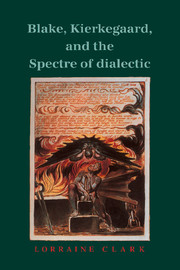Book contents
- Frontmatter
- Contents
- Acknowledgements
- A note on texts and abbreviations
- Introduction
- 1 The Spectre and the logic of error
- 2 The Spectre as Kierkegaard's concept of dread
- 3 The Spectre and the line of life
- 4 Mastered irony as the ground of human community
- 5 Irony and authority
- Conclusion. Los and the Spectre: master and slave in the labor of the negative
- Notes
- Bibliography
- Index
- Frontmatter
- Contents
- Acknowledgements
- A note on texts and abbreviations
- Introduction
- 1 The Spectre and the logic of error
- 2 The Spectre as Kierkegaard's concept of dread
- 3 The Spectre and the line of life
- 4 Mastered irony as the ground of human community
- 5 Irony and authority
- Conclusion. Los and the Spectre: master and slave in the labor of the negative
- Notes
- Bibliography
- Index
Summary
No, everything has its dialectic, not indeed such a dialectic as makes it sophistically relative (this is mediation), but a dialectic by which the absolute becomes manifest as the absolute by virtue of the dialectical.
Johannes Climacus, Concluding Unscientific PostscriptI will compel thee to rebuild by these my furious waves Death choose or life thou strugglest in my waters, now choose life.
Blake, The Four ZoasBlake scholarship has been persistently rife with analogues, and the appearance of yet another is likely to meet with skepticism if not outright dismay. But the idea of an analogue in Kierkegaard is a compelling one: despite Blake's Nietzschean moments, Kierkegaard's radically individual Protestantism or “Christianity” – the tension between religion and nihilism in his work – has always suggested a better analogue for Blake, whose figure of Christ in his last poem Jerusalem invokes at least a theological remnant of sorts. Deconstructive and poststructuralist criticism have brought this latent analogue into sharper prominence, for it has been increasingly observed of both authors that they are curiously at once “proto-deconstructive,” one might say (although I must apologize for this extraordinarily ugly adjective), and anti-deconstructive. Indeed, Kierkegaard has been thoroughly deconstructed to the point that he has himself become a master deconstructionist who brings his corrosive skepticism to bear on the question of religion or any metaphysics of presence. Blake thus far has proved more resistant to such dissolution, and it is interesting to speculate why this should be so.
- Type
- Chapter
- Information
- Blake, Kierkegaard, and the Spectre of Dialectic , pp. 1 - 22Publisher: Cambridge University PressPrint publication year: 1991



